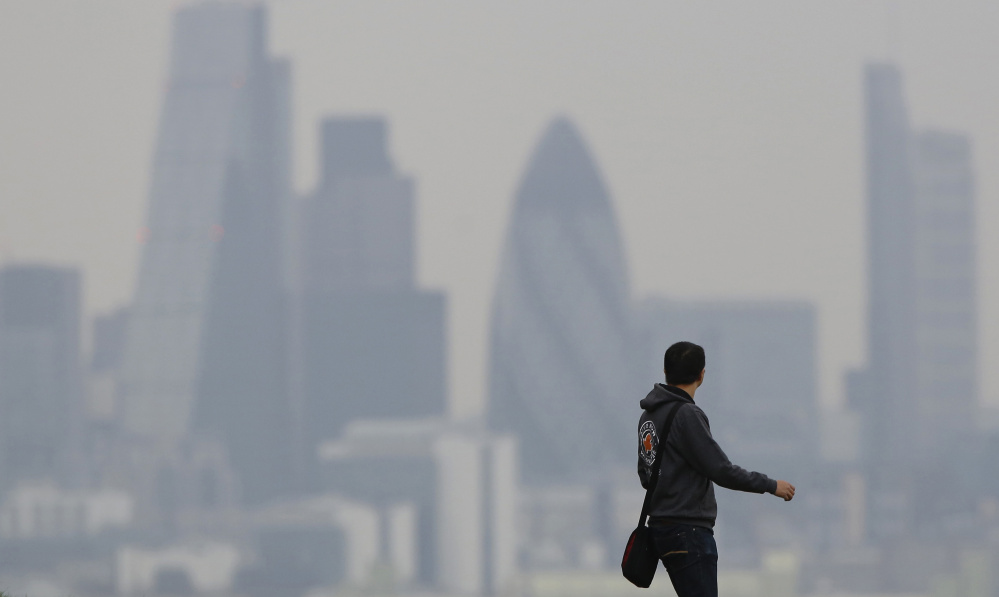The Washington Post.
LONDON— It’s Christmastime on Oxford Street. Brilliant displays of white lights rain from above. Decked-out shoppers dash from one gaudy sale to the next. And Johnny Conquest breathes in poison.
“The air is horrible. The taxis stop right here, and when they take off, boom, you can taste it,” says the 67-year-old as the heavenly smell of the caramel peanuts he hawks from a humble street stall mingles with the sickly stench of diesel. “I’m on the worst corner in London.”
In at least one important respect, it may be the worst in the world.
London has come a long way since the days when its infamous coal-fired pollution shrouded Sherlock in a permanent haze or struck at least 4,000 residents dead in less than a week.
But the city’s overreliance on diesel-powered vehicles has given it a dubious distinction: a global leader in nitrogen dioxide, a particularly noxious pollutant that shortens the lives of thousands of Londoners a year.
Here and in cities across environmentally minded Europe, NO2 levels are substantially higher than in North America, or even in Asian and African mega-cities whose names have become bywords for dirty air. And that is all because of decades of government incentives designed, ironically, to spur the purchase of supposedly cleaner diesel cars and trucks.
“It’s a complete policy failure,” said Gary Fuller, who directs an air-quality-study center at King’s College London. “No one could defend this.”
Now, rather than try, European mayors are declaring war on diesel, hoping to give their cities a clean start.
This month, mayors of three major European capitals, plus Mexico City, announced ambitious plans to ban all diesel vehicles within the next decade.
“We can no longer tolerate air pollution and the health problems and deaths it causes, particularly for our most vulnerable citizens,” said Paris Mayor Anne Hidalgo, who was joined in the pledge by the mayors of Athens and Madrid.
London’s new mayor, Sadiq Khan, has not gone as far –- yet. But he has made reducing air pollution a central pillar of his young administration, more than doubling funding for clean-air campaigns with a billion-dollar commitment and announcing plans that will radically transform the city’s fleet of iconic – but diesel-dependent – taxis and buses.
“With nearly 10,000 Londoners dying early every year due to air pollution, tackling poor air quality is a public health emergency,” Khan said in announcing the moves.
The scale of the challenge has been on display recently in cities across the continent. Paris this month experienced its worst air-pollution episode in a decade, with a thick blanket of ugly air smothering the City of Light for days. Municipal leaders temporarily made public transit free to cut cars from the roadways.
In Milan, safe limits on dangerous fine particles were breached each day for a week, prompting the city council to stiffen a ban on the worst-polluting diesel vehicles. Wood-burning fires also were forbidden, a decision that echoed that of a town near Naples, which last year outlawed pizza-making in a bid to cleanse its choking air.
London, too, has been feeling the effects, with air-quality-monitoring stations this month showing some of the worst pollutant levels in recent years.
The diesel push has meant that although air in Europe is far cleaner overall than in many parts of the globe, it still can be – and often is – deadly.
“It’s been a public health catastrophe on an unimaginable scale,” said Simon Birkett, founder and director of the advocacy group Clean Air in London.
Copy the Story LinkSend questions/comments to the editors.



Success. Please wait for the page to reload. If the page does not reload within 5 seconds, please refresh the page.
Enter your email and password to access comments.
Hi, to comment on stories you must . This profile is in addition to your subscription and website login.
Already have a commenting profile? .
Invalid username/password.
Please check your email to confirm and complete your registration.
Only subscribers are eligible to post comments. Please subscribe or login first for digital access. Here’s why.
Use the form below to reset your password. When you've submitted your account email, we will send an email with a reset code.